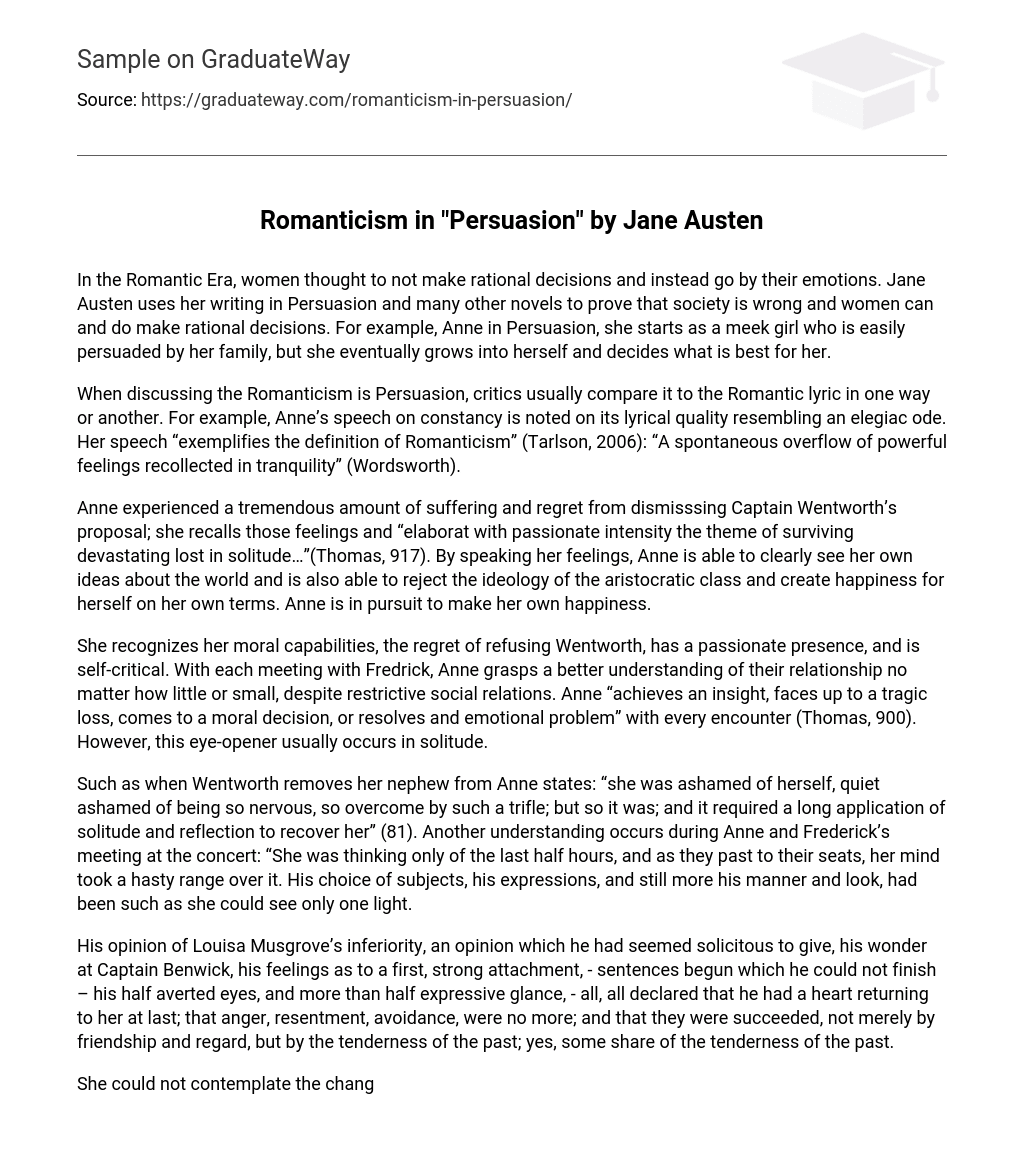In the Romantic Era, women thought to not make rational decisions and instead go by their emotions. Jane Austen uses her writing in Persuasion and many other novels to prove that society is wrong and women can and do make rational decisions. For example, Anne in Persuasion, she starts as a meek girl who is easily persuaded by her family, but she eventually grows into herself and decides what is best for her.
When discussing the Romanticism is Persuasion, critics usually compare it to the Romantic lyric in one way or another. For example, Anne’s speech on constancy is noted on its lyrical quality resembling an elegiac ode. Her speech “exemplifies the definition of Romanticism” (Tarlson, 2006): “A spontaneous overflow of powerful feelings recollected in tranquility” (Wordsworth).
Anne experienced a tremendous amount of suffering and regret from dismisssing Captain Wentworth’s proposal; she recalls those feelings and “elaborat with passionate intensity the theme of surviving devastating lost in solitude…”(Thomas, 917). By speaking her feelings, Anne is able to clearly see her own ideas about the world and is also able to reject the ideology of the aristocratic class and create happiness for herself on her own terms. Anne is in pursuit to make her own happiness.
She recognizes her moral capabilities, the regret of refusing Wentworth, has a passionate presence, and is self-critical. With each meeting with Fredrick, Anne grasps a better understanding of their relationship no matter how little or small, despite restrictive social relations. Anne “achieves an insight, faces up to a tragic loss, comes to a moral decision, or resolves and emotional problem” with every encounter (Thomas, 900). However, this eye-opener usually occurs in solitude.
Such as when Wentworth removes her nephew from Anne states: “she was ashamed of herself, quiet ashamed of being so nervous, so overcome by such a trifle; but so it was; and it required a long application of solitude and reflection to recover her” (81). Another understanding occurs during Anne and Frederick’s meeting at the concert: “She was thinking only of the last half hours, and as they past to their seats, her mind took a hasty range over it. His choice of subjects, his expressions, and still more his manner and look, had been such as she could see only one light.
His opinion of Louisa Musgrove’s inferiority, an opinion which he had seemed solicitous to give, his wonder at Captain Benwick, his feelings as to a first, strong attachment, – sentences begun which he could not finish – his half averted eyes, and more than half expressive glance, – all, all declared that he had a heart returning to her at last; that anger, resentment, avoidance, were no more; and that they were succeeded, not merely by friendship and regard, but by the tenderness of the past; yes, some share of the tenderness of the past.
She could not contemplate the change as implying less. – He must love her” (185-186). Anne reads into these meetings coming up with conclusions no matter if they are wrong or right. For instance, she often comes to the wrong conclusion when it comes to Fredrick’s actions, “the result of the wild imagination” (Thomas, 902). Persuasion center’s on Anne’s quest for her object, Wentworth, which will bring her happiness. A Romantic shift occurs in Anne when she is physically able to express herself through the use of imagination, such as her “consistency” speech.
The more Anne begins to assert herself the more progressive and happier she becomes, all due to the “recognition of the value of her own ability to choose for herself” (Tarlson, 5). “Literature serves a very different purpose in Persuasion than in her other novels, because it is something to be considered, treasured and used as a moral and emotional guide… it necessitates her rejection of the social and familial pressures upon her in favor of an enlightened emotional life” (Tarlson, 12-13).
The Romantic literature, in particular, allows Anne to realize the amount of freedom she should be able to have in her pursuit for happiness. Anne broke off the proposal with Wentworth the first time because she was persuaded that he would provide for her materially for her because he was not in the aristocracy. But when she chooses him the second time, it is not because he is a changed man but because “she had the courage to choose for herself without regard to aristocratic nation of class” (Tarlson).
Anne had the ability to change herself and the situation and take advantage of it. Persuasion is a Romantic text in theme and structure; in contains sensitivity to loss, solitude in estrangement, interest in memory (the long regret over a broken proposal), the complexity and understanding of the passage of time, recovery of the past, concern over the poor, and the importance of feelings. All of these are applicable to the influence of the Romantic Era.





